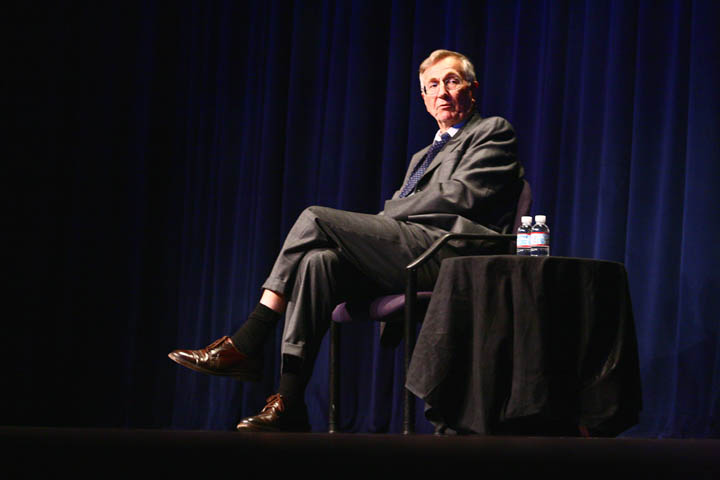One night in March 1968, commanding officers of the U.S. Army and troops from the ghettos, barrios and rural areas of America drank and “toked it up” in anticipation of an attack on Vietnamese enemies the next day.
What followed on that day would come to be known as the “My Lai Massacre,” in which these U.S. Army troops killed more than 500 unarmed Vietnamese civilians at the behest of their superiors.
Legendary investigative reporter Seymour Hersh’s reports on the My Lai massacre would inflame the American public and fuel the Anti-war movement, as well as earn him the International Reporting Pulitzer Prize in 1970.
“All wars have dirty secrets,” Hersh told his audience in the Carpenter Center on Wednesday.
Hersh came to Cal State Long Beach to talk about reporting on the Abu Ghraib prisoner tortures, his emphatic disdain of the Bush administration, the importance of the media and the moral challenges facing the U.S. in disengaging from Iraq.
“These kids today have these stories,” he said in regards U.S. troops fighting in Iraq. Hersh commented on the tragic number of troops coming home with physical and mental problems — which he said is more than 600,000.
“The problem is that nobody talks about the war,” he said. “What war is really like is never part of the debates, they just mention the heroics of troops.”
Hersh’s biggest concern with the Iraq War is the responsibility to fulfill the country’s moral obligation to the innocents of Iraq and the need to get neighboring countries involved.
“[Bush] believes in Democracy and he thinks things are okay. He has not learned anything. He still thinks we did the right thing,” said Hersh. “I don’t think Bush is a liar, he is just in a different state of mind.”
He believes the relative calming we are seeing currently in Iraq is merely a temporary calm, and that real political stability is yet to be established.
“It doesn’t matter what I think. My friends on the inside, they’re very worried about our future,” he said.
Hersh bemoaned the press’ failure to properly investigate the steps leading to the war in Iraq, but that the failure highlights the need for the media
“History is going to be cheated by this White House,” Hersh said. “Our press just sort of got bullied by this guy(Bush) and we went along.”
In the panel discussion following the lecture, Hersh commented on the sate of media in America, saying it is in “a downward spiral.” He criticized media bodies’ response to new forms of journalism by cutting back on staff, rather than responding with reporting that stimulates readers in new ways.
“Instead of responding, they cut back product,” Hersh said.
When asked what beginning investigative journalists need to do to succeed, he said, “Read before you write and get the hell out of the way of the story.”




